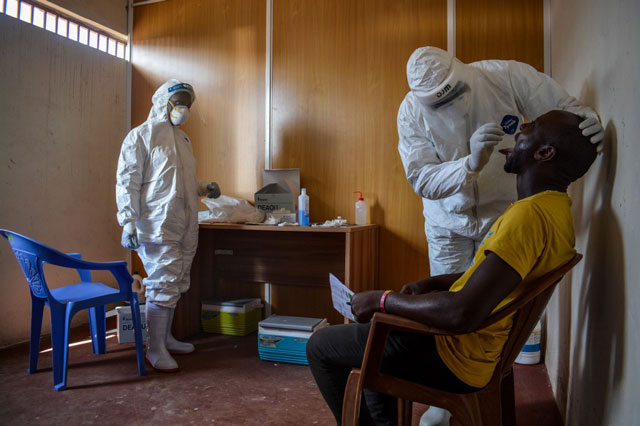
Kyotera, Uganda | THE INDEPENDENT | Kyotera district COVID-19 task force is stuck with ten confirmed cases of coronavirus disease due to lack of transport to Masaka Hospital.
The patients have been in isolation since last week, Monday when they tested positive during the community mass surveillance testing exercise in Nangoma sub-county.
Dr Edward Muwanga, the Kyotera District Health Officer and secretary to the task force says they do not have funds to buy fuel to transport the patients to Masaka. The island sub-county lacks a treatment centre.
A health worker, who is monitoring the ten patients says they are complaining of neglect and have been demanding to be taken for treatment or else they leave the temporary isolation area. The group has given the authorities a three-days ultimatum to transfer them to Masaka for treatment.
Muwanga says the pressure from the patients has triggered panic among health workers and residents.
Dr Ronald Reagan Mutebi, the head of the mass surveillance program in Nangoma and Kasensero says some of the COVID-19 patients are on anti-retroviral drugs and need special attention. He explains that they have appealed to the task force to find a solution before the situation runs out of hand.
He says that it would be difficult to trace their contacts and patients if they escape from the temporary area. He has appealed to the Health Ministry to set up special isolation and treatment centres in Nangoma and Kasensero which are considered hard to reach areas.
Maj. David Matovu, the Kyotera Resident District Commissioner has called for calm as the task force finds means to transfer the patients. The health authorities have appealed to development partners including World Vision and Rakai Health Sciences Programme to intervene and set up isolation and treatment centres to avoid the delayed transportation and treatment of the suspects.
According to Dr Diana Atwine, the Health Ministry Permanent Secretary, Kasensero and Nangoma are high-risk areas because of easy access by Tanzanian nationals.
******
URN
 The Independent Uganda: You get the Truth we Pay the Price
The Independent Uganda: You get the Truth we Pay the Price



